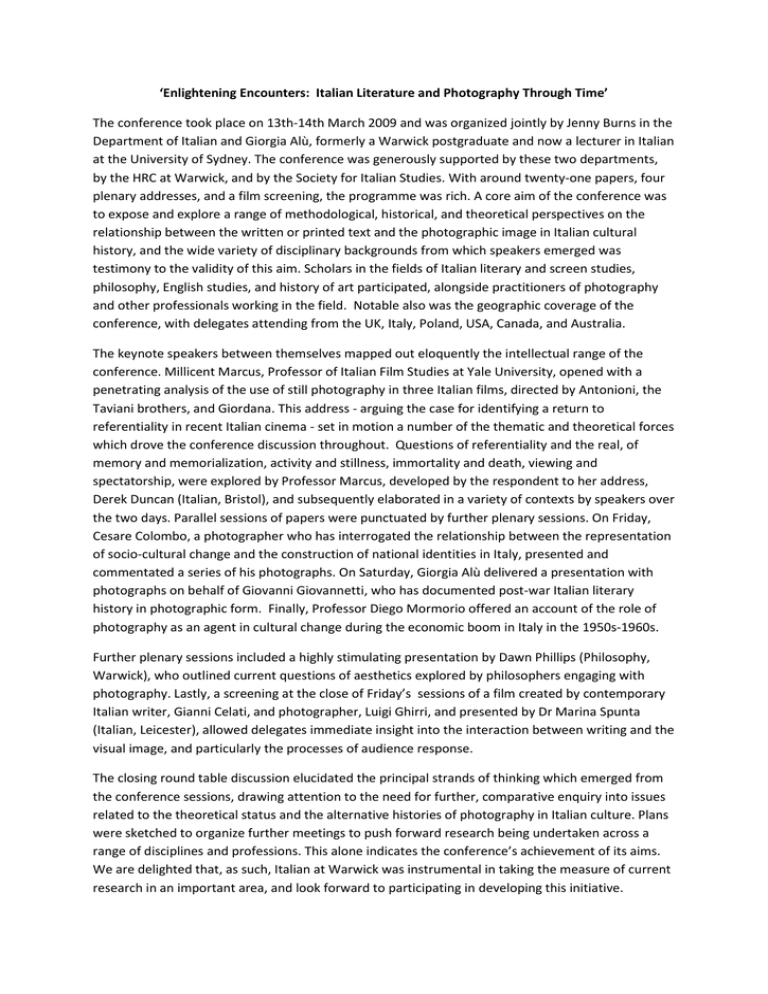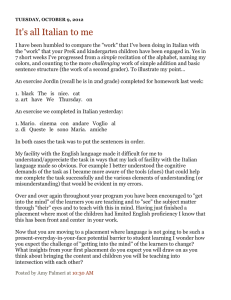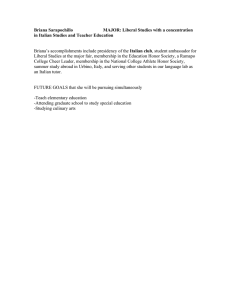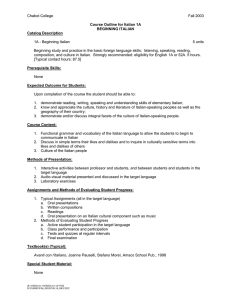‘Enlightening Encounters: Italian Literature and Photography Through Time’
advertisement

‘Enlightening Encounters: Italian Literature and Photography Through Time’ The conference took place on 13th-14th March 2009 and was organized jointly by Jenny Burns in the Department of Italian and Giorgia Alù, formerly a Warwick postgraduate and now a lecturer in Italian at the University of Sydney. The conference was generously supported by these two departments, by the HRC at Warwick, and by the Society for Italian Studies. With around twenty-one papers, four plenary addresses, and a film screening, the programme was rich. A core aim of the conference was to expose and explore a range of methodological, historical, and theoretical perspectives on the relationship between the written or printed text and the photographic image in Italian cultural history, and the wide variety of disciplinary backgrounds from which speakers emerged was testimony to the validity of this aim. Scholars in the fields of Italian literary and screen studies, philosophy, English studies, and history of art participated, alongside practitioners of photography and other professionals working in the field. Notable also was the geographic coverage of the conference, with delegates attending from the UK, Italy, Poland, USA, Canada, and Australia. The keynote speakers between themselves mapped out eloquently the intellectual range of the conference. Millicent Marcus, Professor of Italian Film Studies at Yale University, opened with a penetrating analysis of the use of still photography in three Italian films, directed by Antonioni, the Taviani brothers, and Giordana. This address - arguing the case for identifying a return to referentiality in recent Italian cinema - set in motion a number of the thematic and theoretical forces which drove the conference discussion throughout. Questions of referentiality and the real, of memory and memorialization, activity and stillness, immortality and death, viewing and spectatorship, were explored by Professor Marcus, developed by the respondent to her address, Derek Duncan (Italian, Bristol), and subsequently elaborated in a variety of contexts by speakers over the two days. Parallel sessions of papers were punctuated by further plenary sessions. On Friday, Cesare Colombo, a photographer who has interrogated the relationship between the representation of socio-cultural change and the construction of national identities in Italy, presented and commentated a series of his photographs. On Saturday, Giorgia Alù delivered a presentation with photographs on behalf of Giovanni Giovannetti, who has documented post-war Italian literary history in photographic form. Finally, Professor Diego Mormorio offered an account of the role of photography as an agent in cultural change during the economic boom in Italy in the 1950s-1960s. Further plenary sessions included a highly stimulating presentation by Dawn Phillips (Philosophy, Warwick), who outlined current questions of aesthetics explored by philosophers engaging with photography. Lastly, a screening at the close of Friday’s sessions of a film created by contemporary Italian writer, Gianni Celati, and photographer, Luigi Ghirri, and presented by Dr Marina Spunta (Italian, Leicester), allowed delegates immediate insight into the interaction between writing and the visual image, and particularly the processes of audience response. The closing round table discussion elucidated the principal strands of thinking which emerged from the conference sessions, drawing attention to the need for further, comparative enquiry into issues related to the theoretical status and the alternative histories of photography in Italian culture. Plans were sketched to organize further meetings to push forward research being undertaken across a range of disciplines and professions. This alone indicates the conference’s achievement of its aims. We are delighted that, as such, Italian at Warwick was instrumental in taking the measure of current research in an important area, and look forward to participating in developing this initiative. All images © Giovanni Giovannetti Pier Paolo Pasolini Niccolo Ammaniti Attilio Bertolucci Rita Levi Montalcini



